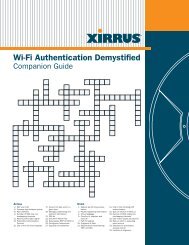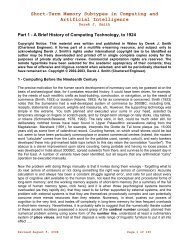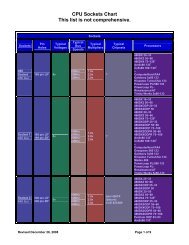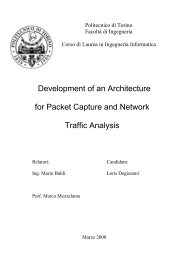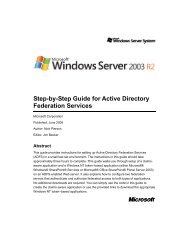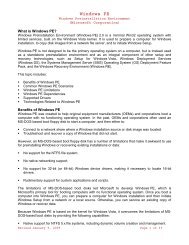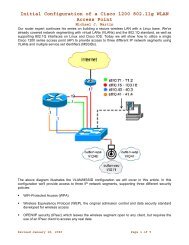SCO UnixWare 2.1 Technical Summary - Bandwidthco Computer ...
SCO UnixWare 2.1 Technical Summary - Bandwidthco Computer ...
SCO UnixWare 2.1 Technical Summary - Bandwidthco Computer ...
You also want an ePaper? Increase the reach of your titles
YUMPU automatically turns print PDFs into web optimized ePapers that Google loves.
Application Debugger<br />
<strong>SCO</strong> <strong>UnixWare</strong> <strong>2.1</strong><br />
The SDK includes graphical windowing debugger for source-level application debugging that<br />
supports multi-threaded applications and LWPs. The graphical debugger can track multiple<br />
threads and processes executing on independent processors simultaneously. The user is given<br />
complete control over the execution of the program and the examination of its state. The debug<br />
program provides both a command line interface and an X Windows based graphical user<br />
interface. The graphical debugger has the capability of configuring the user interface to meet the<br />
developer’s current needs. By default the graphical debugger displays the following nine panes<br />
in a series of six windows:<br />
• process (list of processes and threads)<br />
• stack (stack trace of current object)<br />
• symbols (visible symbols in current context)<br />
• registers (machine registers for current process or thread)<br />
• disassembly (disassembly of current function)<br />
• source (current source file)<br />
• event (stop, signal, syscall events)<br />
• command (entry of debugger commands)<br />
• status (status of current process or thread)<br />
The look and layout of the debugger windows in the graphical environment is highly<br />
customizable, allowing developers to zero in on problems more quickly and easily.<br />
Kernel Debugger<br />
A threads-aware multiprocessing kernel debugger is provided to assist in the porting and<br />
debugging of kernel modules and drivers by allowing developers to examine and control a<br />
running kernel. This benefits system developers by reducing the development time needed to<br />
incorporate new modules into the system.<br />
Performance Management Tools<br />
A new profiling tool, fprof, is provided to support flow and time profiling. Flow tracing is a form<br />
of tracing used to analyze performance and locality of reference of text. The information<br />
produced by this profiling tool can be used for performance analysis or locality of reference<br />
tuning. The lprof tool is another profiling tool which displays line-by-line execution count profile<br />
data for a source file. In addition, the basic prof profiling tools now support C++ and dynamic<br />
shared libraries. A set of Metric Access Support (MAS) functions are provided to allow<br />
applications to advertise and gather performance metrics. The raw metric data can be analyzed<br />
to determine how best to improve the performance of a specific application, or even of the<br />
operating system.<br />
IHV Development Kit<br />
An Independent Hardware Vendor (IHV) Development Kit<br />
, packaged as part of the SDK,<br />
provides the tools, documentation, instructions and sample code required to write device drivers<br />
for new hardware devices. The Kit contains an extended set of sample software code and<br />
development tools to assist IHV developers when creating/updating <strong>SCO</strong> <strong>UnixWare</strong> device<br />
drivers. The kit contains:<br />
• sample drivers for video screens<br />
• screen interface (SI) modules, Host Bus Adapter (HBA) drivers, and networking drivers,<br />
in both uni-processor and multiprocessor versions.<br />
• README files, containing details about each of the included drivers and other related<br />
technical information.<br />
• HBA and LAN pre-certification kit, which facilitates testing the integrity of the HBA and<br />
network driver floppies used to install HBA and LAN driver packages.<br />
43



